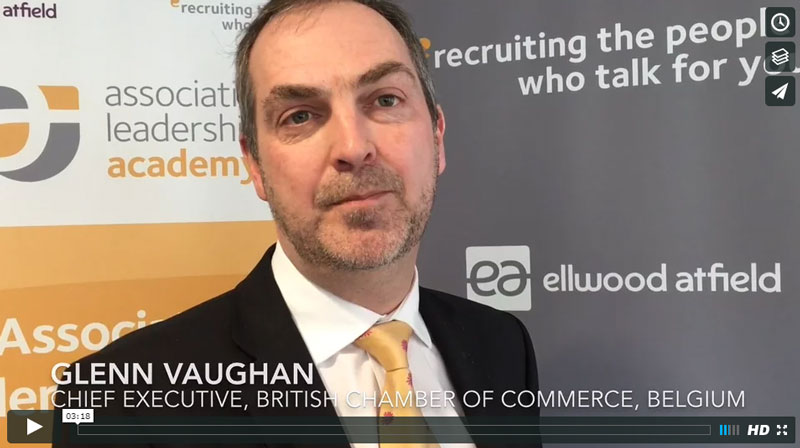
Whichever way the UK referendum vote on EU membership goes, things will not be the same… What does this mean for EU associations, professional societies and their UK based counterparts?
This event for association leaders, aimed to inform, raise awareness and incite preparedness for whatever outcome is adopted.
Associations and professional societies are the largest group of registrants in the EU Transparency register, representing a broad constituency of potential political and commercial influence. Our research had shown that there had been no horizontal debate about the potential effects of Brexit, and a majority of organisations approached had formally adopted a position of neutrality.
The lunch debate was generously hosted by the British Chamber of Commerce. Glenn Vaughan, Chief Executive, spoke first to set the scene. We were also honoured to welcome Anthony Murphy, non- executive Director of the London based Trade Association Forum as our second speaker, responding to the points raised in a personal capacity.
fear and prolonged period of uncertainty
Anthony Murphy spoke of so called Project Fear, the scenario created by pro EU supporters who paint a picture of Britain “shivering in the dark” if Brexit should occur. Indeed, the UK imports twice as much food as it exports, so the imposition of cross-border tariffs will have an impact, as would a 10% tariff on cars. Depreciation against the US Dollar and the Euro would make fuel and holidays more expensive. Migrants account for around 12% of jobs in the hospitality sector and about 9% in manufacturing. Last year more than 200,000 newly created jobs were filled by EU migrants – if they left, and with unemployment at its lowest level since 2006 there’s probably too little flexibility in the labour market to fill the gaps.
The “Remain” campaign seems to also be supported by sectoral self-interest. UK farmers receive £3 billion per year from the Common Agricultural Policy fund; an average of 55% of their income. There are over 2 million UK passport holders living in the EU who might face a negative impact on health insurance and employment rights should Brexit come about. Many well-known UK charities depend on EU funding and scientists, including Stephen Hawking, and academics have written of a brain drain to “The Times” newspaper, should the UK leave the EU.
Anthony stated that much of Brexit bile was reserved for EU regulation.
The Open Europe think tank claimed that £33.3 billion was spent on the top EU 100 regulations. This figure however is unlikely to change significantly in the event of a win for the “out” campaign since, as Wolfgang Schauble, German Finance Minister, has already said, if the UK wanted access to the Single Market then it must abide by the common rules. Norway, a member of the EEA, is bound by 93 of the top 100 regulations, so the impact on UK firms would still be of the order of £31.4 billion per year. Note that Norway has to adopt five regulations per week for European Economic Area compliance reasons… and these are regulations over which they have no influence since they have no seat at the EU table.
doing the hokey cokey: Brexit status and process
Both Glenn and Anthony referred to a UK Cabinet Office publication on Brexit which sets out procedures to be adopted for each political scenario. Article 50 of the Lisbon Treaty refers to a two year negotiation process should the UK vote to withdraw from the EU. Anthony remarked that it took Greenland 3 years to agree terms to withdraw in 1985. How speedily would Britain be able to disentangle itself after having been a member since 1973? The Cabinet Office publication referred to a possible decade of uncertainty for business and citizens. Also, how quickly might the UK forge bilateral trade deals with other countries? The EU/Canada trade deal took 4 years to negotiate till October 2012 but will not be fully ratified until the end of this year.
Creating a Commonwealth Free Trade Agreement embracing 52 countries (a key Brexit ambition), could be complex and time-consuming at the least.
considerations for associations, professional societies and NGOs
Political neutrality should not equate to inactivity – associations should and can play a key role in the preparedness of both their UK and non UK members. Organisations should start preparing for an extended period of European political, financial and economic instability. A UK exit would lead to a period of significant market and financial turbulence. Other EU countries would have an incentive to make the exit costly and difficult to stem the rise of euro-scepticism in their own countries. Financial investors will see an opportunity to make money from pressure on the pound, while trade deals such as TTIP would be thrown into doubt.
In the run up to the referendum, organisations are expected to have a position, and should be ready to answer questions publicly.
leading the dance step by step
- Survey your members and your closest stakeholders on their activity with and in the UK and carry out financial impact analyses;
- What is the position of your UK member – will they remain in your organisation with maybe a greater need for input and alignment than before?
- Look in particular at non-tariff barriers (for business associations) and any effects on certification (for professional societies);
- Consider alternative revenue streams for funding if you are a UK based charity or civil society organisation – the EU is an increasingly reluctant donor…
Finally, when the dust has settled, anticipate an anti UK backlash! For some, Brexit might appear as a quintessentially English “storm in a teacup” set against the back drop of world terrorism, an EU wide migration crisis and a global recession. I, for one, might find myself queueing for a work permit at my local Commune!



